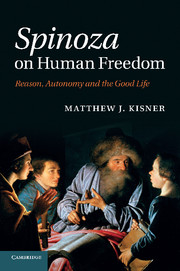Book contents
- Frontmatter
- Contents
- Abbreviations and translations
- Acknowledgments
- Introduction: Beyond therapy
- 1 Freedom as rationality
- 2 Justifying Spinoza's conception of freedom
- 3 Autonomy and responsibility
- 4 Freedom and happiness
- 5 The good
- 6 The natural law
- 7 Benevolence
- 8 The free man
- 9 Rational deliberation
- 10 The character of freedom
- 11 The freedom of the citizen
- Conclusion: “The true freedom of man”
- Bibliography
- Index
Conclusion: “The true freedom of man”
Published online by Cambridge University Press: 01 March 2011
- Frontmatter
- Contents
- Abbreviations and translations
- Acknowledgments
- Introduction: Beyond therapy
- 1 Freedom as rationality
- 2 Justifying Spinoza's conception of freedom
- 3 Autonomy and responsibility
- 4 Freedom and happiness
- 5 The good
- 6 The natural law
- 7 Benevolence
- 8 The free man
- 9 Rational deliberation
- 10 The character of freedom
- 11 The freedom of the citizen
- Conclusion: “The true freedom of man”
- Bibliography
- Index
Summary
At bottom, this book is about a difficult question concerning Spinoza's theory of freedom, one which is posed by Spinoza's very definition of it. The definition offers a picture of ideal freedom, complete and perfect self-determination, which stands in stark contrast to the necessary passivity of human existence. The question is not how this is consistent, or how freedom can be a realistic ethical goal – though these are important as well – but rather, what freedom is for us, mere mortals, in other words, what is the nature of living, breathing, flesh-and-blood freedom? This question is as much one that, for Spinoza, is philosophical as it is, for his readers, interpretive. For, if freedom consists in self-determination, which humans, by their nature, can only possess to a limited degree, then understanding human freedom requires determining the precise extent to which they can become self-determined and the particular human activities that do and do not contribute to their self-determination.
In explaining Spinoza's response to this question, I have been keen to refute an opposing answer, one that is seductive in its simplicity but overlooks some of the most important and interesting aspects of his philosophy. The answer supposes that Spinoza only conceives of freedom in ideal terms, as divine self-determination, the perfect reasoning of adequate ideas or the ethical perfection of the free man.
- Type
- Chapter
- Information
- Spinoza on Human FreedomReason, Autonomy and the Good Life, pp. 236 - 247Publisher: Cambridge University PressPrint publication year: 2011



